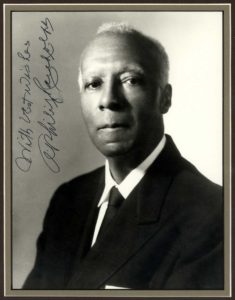Asa Philip Randolph (1889-1979), Labor and Civil Rights Leader, Socialist, and Foremost Architect for Change, Conway Studio inscribed photo, 1950.
An apt student of politics and economics, Asa Philip Randolph, unlike Du Bois, believed it would be the black working class, and not the black elite, that could effect social and economic change.
Randolph understood not only power, but the power of numbers. Although intellectual and aloof, it was he who over time developed the strategies and tactics of non-violence and direct action that would propel the Civil Rights movement to its apogee. Mass marches, demonstrations, boycotts, pickets, strikes, and sit-ins would become the means.
In 1925, he became the chief organizer of the Brotherhood of Sleeping Car Porters, and during a protracted struggle, led them to become the strongest black labor union by winning a settlement with the railroads in 1937.
The achievement made Randolph a hero to the nascent black labor movement. Soon heading the National Negro Congress, a coalition of labor organizations, he resigned in 1940, believing the group to be under communist control.
In 1941, Randolph organized a March on Washington, and, when Franklin D. Roosevelt demanded its cancellation, pressured him to issue Executive Order No. 8802, banning discrimination within the defense industry. On June 25, 1941, FDR created the Fair Employment Practice Committee, an independent agency with 12 regional offices.
This triggered the Second Great Migration of over 5 million African Americans, many going westward, which continued until 1970. Black labor within the burgeoning aircraft industry increased from less than two to over eight percent, creating jobs which tended to persist long after WWII ended.
Randolph’s organization used a similar tactic with President Truman to end segregation within the armed forces. He also organized the momentous 1963 March on Washington for Jobs and Freedom. Randolph later became a vice-president of the AFL-CIO, and chaired the Negro American Labor Council.
His words resonated and still do, “Those who deplore our militants, who exhort patience in the name of a false peace, are in fact supporting segregation and exploitation. They would have social peace at the expense of social and racial justice. They are more concerned with easing racial tension than exploring racial democracy.”


